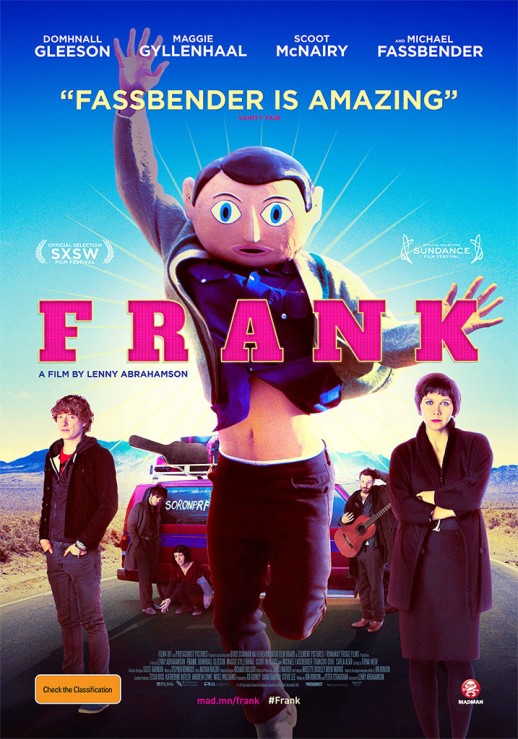Movie Breakdown: Frank (Noah)
People are doing traditional-style reviews all over the web, so we decided to try something different. In each “breakdown” we’ll take a look at what a film’s marketing led us to believe, how the movie actually played, and then what we learned from it all. Read on!
The Impression:
This is a movie where a world famous movie star wears a giant paper mache head for the entire film. I’d say I’m pretty excited.
The Reality:
Lenny Abrahamson’s Frank is an impressively strange, and at times wonderful film, that comes loaded with an armada’s worth of observations about the indie music world. So many in fact that when the film ends, you wonder just where exactly Abrahamson and Jon Ronson (the writer of the screenplay and the original article on which it was based) stand on the whole thing. Domhnall Gleeson plays Jon, a British 20-something stranded in a dead-end suburb with, seemingly, no musical talent and an ambition to be a star. When he stumbles across a crumbling band in need of a keyboardist, his dreams, or so he believes, suddenly come true. Enter Frank (Michael Fassbender), the leader of the band, a former mental patient, and a man who wears a giant paper mache mask on his head. At all times. To say that the band (who’s name is so egregiously, and purposefully indie, that I won’t take the time to write it out here) is opposed to success is an understatement, but Jon – a product of the new world of tweeting ‘n’ tumblin’ – wants more. And thus a story is born. The film though, doesn’t live or die by the strength of it’s narrative. This is a film about big personalities crashing against each other, and when Abrahamson gives the time to just let Fassbender (a marvel, even in a fully face covering mask) play his character to his most bizzare extremes, the film feels downright perfect. But this is 2014 and just letting characters smash and bash their personalities against each other is no longer any sort of definition for a film, and thus Abrahamson drops some convenient goals, and even more convenient plot devices to get it moving. These moments, where narrative suddenly jumps out over weirdness, never feel completely true, and you find yourself yearning for Frank to just do to his thing. More so the film struggles to ever pinpoint what it’s saying. Is this is a film about the dwindling authenticity of music? A film about role of mental anguish in creation? A film about the world of social media and what it’s done to a little thing called fandom? Abrahamson and Ronson never say enough to make it clear, and thus the film becomes merely a quirky oddity, nothing more, nothing less.
The Lesson:
Just let the freak flag fly, brother.


